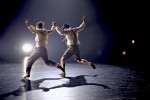From Hofesh Shechter’s barbarians trilogy. (photo by Gabriele Zucca)
Before barbarians was even created, DanceHouse had included the Hofesh Shechter trilogy in its 2015/16 season.
“Programming work before you have had the chance to view and experience it yourself is always risky,” DanceHouse producer Jim Smith told the Independent in an email interview. “Programming work that has not even been completed or performed, some would say is even way beyond this risk, primarily because no one can speak to the work other than the artist who is in the process of making it. However, if we believe in an artist, if we have a relationship with their work and we can see they have developed a track record, then agreeing to present their new work before you get to see it is one of the highest compliments you can offer them. It also allows our audiences the opportunity to see work that is very fresh in its life, before it has been performed elsewhere around the world.
“In the current DanceHouse season,” he continued, “there are two artists whose works were confirmed before they were completed. Hofesh Shechter is one, and the other is Crystal Pite, with her collaboration with Jonathon Young of the Electric Theatre Company and their production titled Betroffenheit (which we will see in February).” Completing the season is Companhia Urbana de Dança in April.
Smith described Hofesh Shechter as “part of an international generation that is currently defining how dance is being made and carving out the state of the (dance) art.” He included Israel’s Sharon Eyal, the United Kingdom’s Wayne McGregor and Vancouver’s Pite in this generation of artists.
The Hofesh Shechter Company was at DanceHouse in 2009. Hosting the company again is very satisfying, said Smith, as it allows local “audiences the chance to see how his work has developed and evolved, allowing them to have a deeper relationship with his work.”
In promotional material, barbarians is described as being about “intimacy, passion and love.” In an interview with artslandia.com, Smith described it as “loud, visceral rage.” Acknowledging the potential incongruence, he said, “I would offer that in exploring the extremes that lead to my characterization of loud, visceral rage, it creates a contrasting space for notions of intimacy, passion and love to emerge, rather than simply being portrayed. I have heard Hofesh himself describe experiencing his work as a series of images that move faster than the mind can necessarily process or think through. He also says his work often reveals frustration and buried hope, and a lot of different emotions that relate to humans under pressure. I think barbarians could be viewed/experienced in this fashion.
“The barbarians program is three distinct works, which makes for a different flow to the evening, rather than one longer single work. There is highly precise movement, and there is baroque music, which gives the effect of things being controlled. However, there is also a sense of things breaking free and getting out of control. The last work on the program is a duet made for two long-standing dancers in the company, which I think reveals the collaborative approach between dancer and choreographer, and also the admiration that exists within those particular relationships.”
DanceHouse has hosted more than one Israeli choreographer or company over the years. Is there an Israeli style?
“There has been much discussion and observation about the work that is of Israeli dance artists and the Diaspora. (For example, Hofesh now resides in the U.K.) Many dance observers would say that it is Ohad Naharin of Batsheva Dance Company that is the central figure who led the Israeli dance domination that has been going on for the past number of years. Artists such as Shechter, but also Sharon Eyal and Andrea Miller – all of whom have been on the DanceHouse stage – are part of a generation that studied and worked with Naharin and Batsheva, and have gone on in the wake to carve out unique and distinctive choreographic voices. I don’t think there is an element or style that we can point to that characterizes or typifies the Israeli work, rather it is a larger sensibility, which you appreciate from experiencing a number of works of these artists and, of course, being able to contrast them with different work.”
barbarians is at Vancouver Playhouse Nov. 13-14, 8 p.m. For tickets, visit dancehouse.ca.

